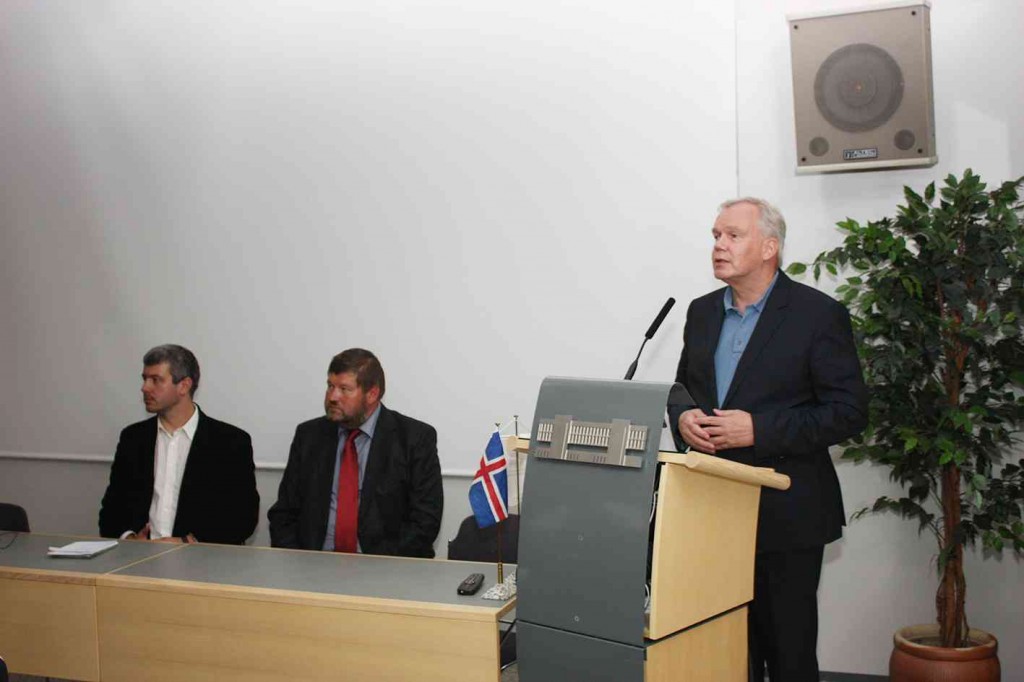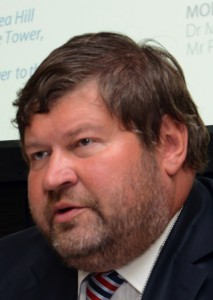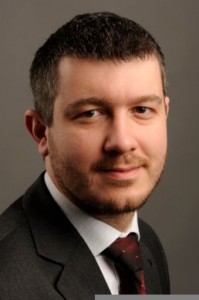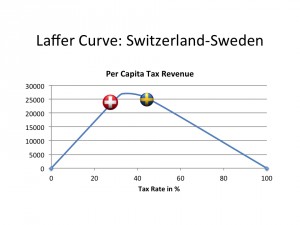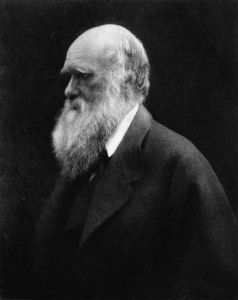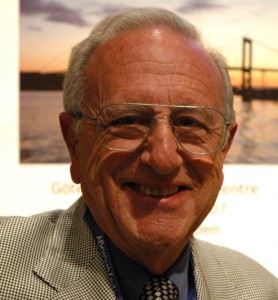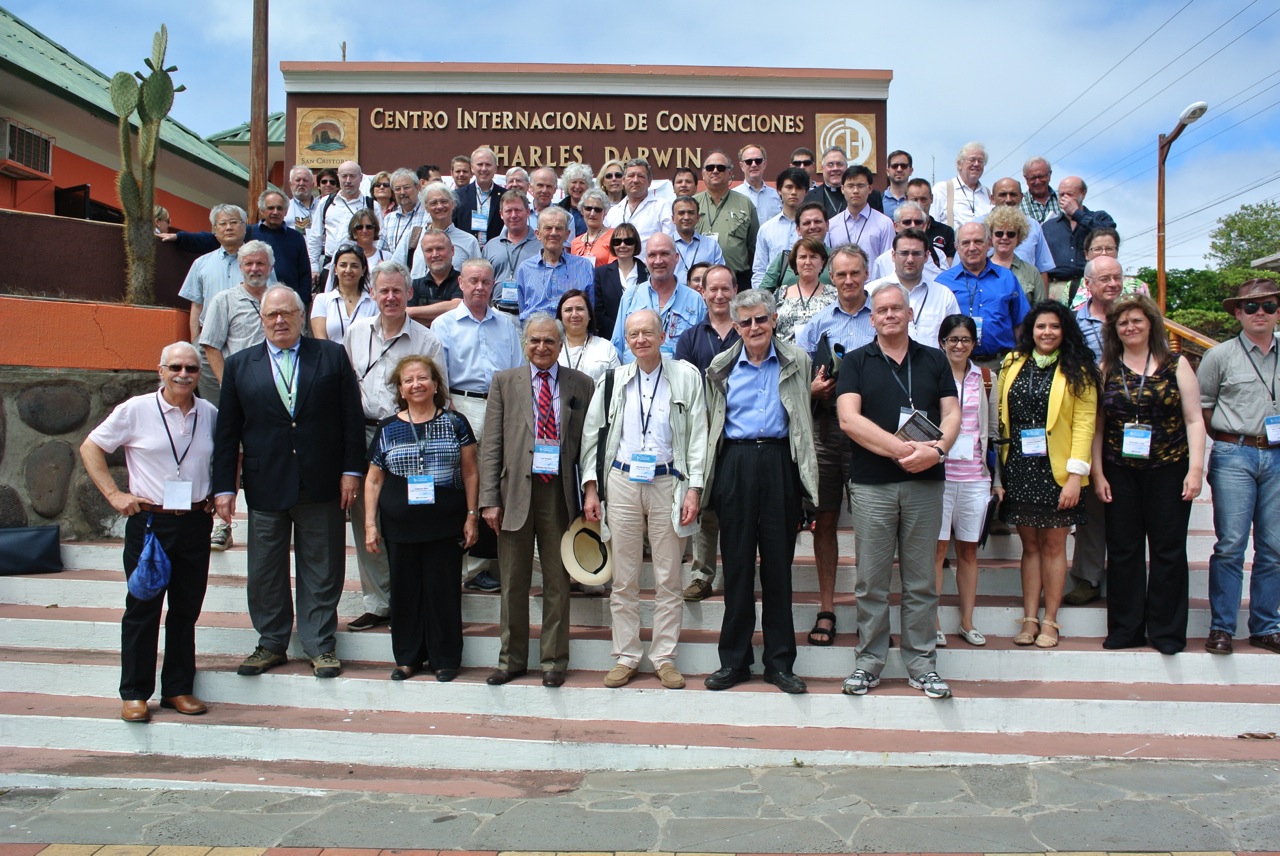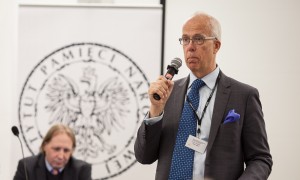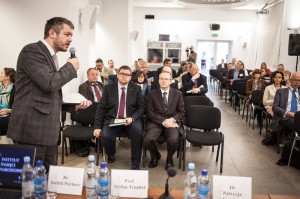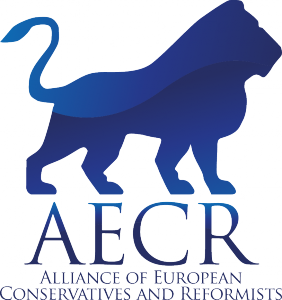 Twenty events are planned in the latter half of 2013, organised, co-sponsored or supported by RNH. One of the most important research areas of RNH is “green capitalism”, the exploration of possibilities of solving environmental problems by defining property rights to natural resources and facilitating free trade in them. On this note, RNH’s academic director, Professor Hannes H. Gissurarson, will participate in a Mont Pelerin Society meeting on the Galapagos Islands 22–29 June 2013 on “Evolution, the Human Sciences and Liberty”. He will be chairing a session on “The Political Animal” 25 June, where the speakers will be Professor Larry Arnhart, Northern Illinois University, and Professor Kenneth Minogue, London School of Economics. Professor Gissurarson’s participation is a part of the joint AECR-RNH research project “Europe, Iceland and the Future of Capitalism”.
Twenty events are planned in the latter half of 2013, organised, co-sponsored or supported by RNH. One of the most important research areas of RNH is “green capitalism”, the exploration of possibilities of solving environmental problems by defining property rights to natural resources and facilitating free trade in them. On this note, RNH’s academic director, Professor Hannes H. Gissurarson, will participate in a Mont Pelerin Society meeting on the Galapagos Islands 22–29 June 2013 on “Evolution, the Human Sciences and Liberty”. He will be chairing a session on “The Political Animal” 25 June, where the speakers will be Professor Larry Arnhart, Northern Illinois University, and Professor Kenneth Minogue, London School of Economics. Professor Gissurarson’s participation is a part of the joint AECR-RNH research project “Europe, Iceland and the Future of Capitalism”.
In July 2013, RNH will, with other institutions and organisations, celebrate Iceland’s Tax Freedom Day, which is the day on which an ordinary Icelander starts to work for himself, and ceases to work for government. RNH’s participation in this event forms a part of the joint AECR-RNH project “Europe, Iceland and the Future of Capitalism”.
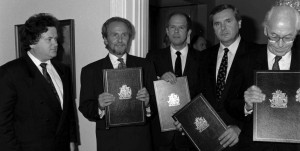
26 August 1991, Iceland reaffirming recognition of Baltic states. From left: D. Oddsson, Prime Minister, J.B. Hannibalsson, Foreign Minister, A. Saudargas, Lithuania, J. Jurkans, Latvia, and L. Meri, Estonia.
23 August has been designed, by the European Parliament, as European Day of remembrance for victims of totalitarianism, both communism and nazism. On this day in 1939 Hitler and Stalin made their non-aggression pact, launching the 2nd World War and dividing Central and Eastern Europe up between the two dictators. On Friday 23 August 2013, 16–19, a photo exhibition on the Icelandic communist movement will be opened at the National Library of Iceland. Historian Dr. Mart Nutt, Member of the Estonian Parliament and Chairman of the Estonian Institute of Human Rights, will deliver a paper on “Estonia: a Small Nation Under Foreign Yoke”. Forty years ago, in 1973, an Icelandic translation by then law student David Oddsson appeared of a book by Anders Küng of the same name (in Icelandic, Eistland: Smathjod undir oki erlends valds). As Prime Minister in 1991, Oddsson led the move to re-recognise the three Baltic states, under foreign occupation from 1940 to 1991. On this occasion, also, Dr. Pawel Ukielski, director of the Warsaw Rising Museum, will give a lecture on the Warsaw Rising in 1944.
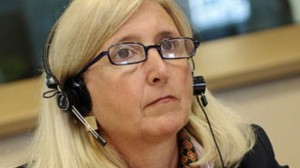
Andreasen
Friday 30 August 2013, 17–18, in Room N-132 in Askja, the Natural Sciences House of the University of Iceland, Marta Andreasen, MPE for the British Conservatives and former Chief Accounting Officer and Budget Execution Director at the European Commission, will give a paper called: “The European Union: Where is It Going?“ Andreasen has been a long-time critic of the corruption and widespread fraud within the European Union. When Andreasen refused to sign the European Commission accounts, she was suspended. In 2009, she published the book Brussels Laid Bare. It is the Icelandic society Thjodrad which invites Ms. Andreasen to Iceland, but RNH promotes and supports this event, as a part of the joint AECR-RNH research project “Europe, Iceland and the Future of Capitalism”. The meeting will be followed by a reception on the premises.
Thursday 12 September 2013, Professor Hannes H. Gissurarson will give a lecture at a conference organised by the Lithuanian Free Market Institute in Vilnius on “Iceland’s Boom and Bust: Lessons for Europe”. He will also attend a workshop a day later on free market think tanks. Friday evening 13 September 2013, Professor Gissurarson will give a talk at a meeting of the Young Libertarian Association in Lithuania on “Hayek, Popper, and Friedman: Personal Recollections”. His three events in Lithuania form a part of the “Europe, Iceland and the Future of Capitalism” joint AECR-RNH project.
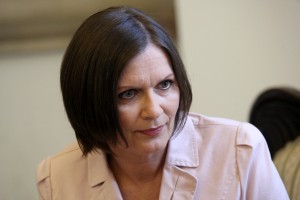
Zver
Monday 16 September 2013, the photo exhibition at the National Library will be closed, in a ceremony where late Professor Arnor Hannibalsson will be specially honoured: a tireless critic of totalitarianism, he quietly supported Russian, Polish and Chinese dissidents. The secret Comintern documents on the Icelandic communist movement which Professor Hannibalsson obtained in Moscow after the fall of communism will be handed over to the National Library where they will be made accessible to all. Moreover, a website with online important books, articles and documents about Icelandic communism will be opened. On this occasion, Slovenian historian Dr. Andreja V. Zver will give a paper at the National Library, 15–16, on why we have to remember the victims of totalitarianism, Nazism, fascism and communism. Illugi Gunnarsson, Minister of Education, will chair the meeting. The photo exhibition at the National Library 23 August to 16 September and related events form part of the joint AECR-RNH project “Europe of the Victims”.
Friday 20 September 2013, in Room 101 in Logberg, 12–13, the Law Faculty House of the University of Iceland, Matthew Elliott from the British Taxpayers’ Alliance will give the case for lowering taxes and constraining government at a meeting co-sponsored by the Icelandic Taxpayers’ Alliance. In 2009, Elliott coauthored a book with David Craig, The Great European Rip-Off: How the Corrupt, Wasteful EU is Talking Control of Our Lives. This event is a part of the joint AECR-RNH project, “Europe, Iceland and the Future of Capitalism”.
Sunday 22 September 2013, Professor Hannes H. Gissurarson will give a lecture on “Iceland’s Boom and Bust: Lessons for Europe” at a conference organised by the European Young Conservatives, EYC, in Churchill College in Cambridge in England. This event is a part of the joint AECR-RNH project, “Europe, Iceland and the Future of Capitalism”. Thursday 3 October, Professor Gissurarson will discuss his research on the 2008 bank collapse at a “research roundtable” organised by the Department of Politics at the University of Iceland in the meeting room on 3rd floor in Gimli, 11.45–13.00. His talk is titled “Did a Shadow Elite Bring About the Icelandic Bank Collapse?”
Monday 7 October 2013, precisely five years will have passed since the collapse of the Icelandic banks. On this occasion, 17–19, in meeting room N-132, in Askja, the Natural Sciences House of the University of Iceland, Dr. Eamonn Butler, Director of the Adam Smith Institute in London, will analyse “The Causes of the International Financial Crisis”. Dr. Pythagoras Petratos, Lecturer in Finance at the Said Business School at Oxford University, will discuss “Cyprus in the Financial Crisis”. This topic is of particular interest in Iceland, since both Iceland and Cyprus are islands, while the difference is that Cyprus is a member of the EU and in the eurozone. Professor Hannes H. Gissurarson will talk about “Reasons for the Icelandic Bank Collapse”. Dr. Asgeir Jonsson will give a paper on “The Aftermath of the Bank Collapse”, on which he is presently writing a book. Dr. Stefania Oskarsdottir, Assistant Professor of Politics at the University of Iceland, will respond to the papers. Ms. Asta Moller, Director of the Institute of Public Administration and Politics, will chair the meeting. The conference forms a part of the joint AECR-RNH project on “Europe, Iceland and the Future of Capitalism”. The Small States Centre at the University of Iceland is a co-sponsor of the conference. The same evening, RNH will host its annual Freedom dinner in Bjortuloft in Harpa, the Reykjavik opera house, with a distinguished speaker, David Oddsson, Prime Minister 1991–2004, Foreign Minister 2004–2005, and Governor of the Central Bank 2005–2009. He will reflect on the chain of events culminating in the bank collapse 6–8 October 2008, including the famous television interview with him on 7 October. Previous speakers at the Freedom Dinners are Dr. Tom Palmer of the Cato Institute in 2011 and Dr. Matt Ridley, the famous science author, in 2012.
Professor Hannes H. Gissurarson will attend a meeting of the Pallanza Group in Italy 10–12 October 2012. Other attendees include Brian Carney of the Wall Street Journal and Professor Pascal Salin from France, Professor Leszek Balcerowicz from Poland (former Governor of Poland’s Central Bank) and Professors Kevin Dowd and Geoffrey Wood from the United Kingdom, but also officials from the European Union and the German Federal Bank.
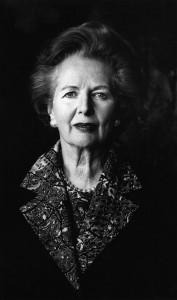
Thatcher
Sunday 13 October 2013 marks the birthday of Mrs. Margaret Thatcher, Baroness Kesteven, Prime Minister of the United Kingdom 1979–1990, who passed away this year. On this occasion, Mr. John O’Sullivan, former editor of National Review, who assisted Mrs. Thatcher with her autobiography will talk about “The Real Iron Lady” at a meeting organised by SUS, the Young Independents. Before his talk, a short documentary about Mrs. Thatcher will be shown. Ms. Hanna Birna Kristjansdottir, Minister of the Interior, will chair the meeting. RNH supports this event as a part of the joint AECR-RNH project “Europe, Iceland and the Future of Capitalism”. It will be held in Room N-132 in the Natural Sciences House, 17–18, followed by a reception on the premises, 18–19.
Monday 14 October 2013, 17–18.30, in the Ceremonies Hall of the University of Iceland, a conference on “The Quota System and the Resource Rent Tax” will be held in honour of late Professor Arni Vilhjalmsson, a leading Icelandic scholar, entrepreneur and supporter of the free market. On this occasion, one of Vilhjalmsson’s companies, Hvalur Inc., will present the University of Iceland with a bust of Vilhjalmsson, sculpted by Gerdur Gunnarsdottir. Professor Ralph Townsend will give a paper about the ITQ—Individual Transferable Quotas—system in fisheries. Professor Ragnar Arnason will discuss the demand for special resource rent taxes in fisheries. Dr. Gunnar Haraldsson, director of the Economic Research Institute at the University of Iceland, will provide an appraisal of the CFP, the Common Fisheries Policy of the EU, the experience and the outlook. Professor Hannes H. Gissurarson will discuss moral arguments on the initial creation of rights to scarce resources. Dr. Dadi Mar Kristofersson, director of the School of Social Sciences at the University of Iceland, will chair the meeting. After the conference, there will be a reception on the premises. This event forms a part of the joint AECR-RNH project “Europe, Iceland and the Future of Capitalism”.
Friday 25th October 2013 will see the 14th annual conference on the social sciences, held at the University of Iceland. The conference is called “Thjodarspegillinn”, The Mirror of the Nation. At a seminar in Haskolatorg, HT-101, 9–10.45, Professor Hannes H. Gissurarson will deliver a paper on “Explanations of the Icelandic Bank Collapse.” He will argue that some common explanations for the collapse are not backed up by sufficient evidence. His paper is a part of the joint AECR-RNH project on “Europe, Iceland and the Future of Capitalism.” At a seminar in the main building of the University, room 220, 11–12.45, Professor Gissurarson will then, with one of his students, Helena Ros Sturludottir, present another paper, “Different Nations, Shared Experiences: The Baltic Countries and Iceland.” Their paper is a part of the joint AECR-RNH project on “Europe of the Victims: Remembering Communism”. The research on it was conducted in cooperation with Unitas Foundation in Estonia and the Occupation Museum Association of Latvia which are working together on a EU-supported project, “Different Nations — Shared Experiences.”
Tuesday 29 october 2013, Professor Hannes H. Gissurarson will give a lecture about the Icelandic bank collapse at a breakfast meeting in Stockholm, organised by Timbro. The other speaker at the meeting is Urban Bäckström, former Governor of the Swedish Central Bank and presently the director of the Swedish Employers’ Association. Professor Gissurarson’s participation in this even forms a part of the joint AECR-RNH project, “Europe, Iceland and the Future of Capitalism”.
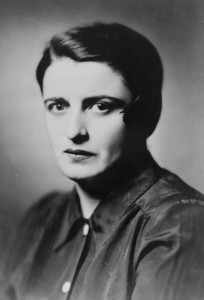
Rand
Friday 1 November 2013, an Icelandic translation of We the Living by Ayn Rand will be published in an edition prepared by broadcaster Frosti Logason, with a postscript by philosopher and lawyer Asgeir Johannesson. Taking place in the first years of the Soviet Union, this is Ayn Rand’s most autobiographical novel. On this occasion, Dr. Yaron Brook from the Ayn Rand Institute in California will talk about Rand and her message for modern man. Short segments of the film made in Italy in 1942 after Rand’s novel will also be shown. The meeting will take place in room N-132 in Askja, the Natural Sciences House of the University of Iceland, 17.15–18.00, followed with a reception on the premises from 18.00–19.00. The publication of the novel and Brook’s lecture form a part of the joint AECR-RNH project “Europe of the Victims”.
Monday 4 November 2013, 12-13 in Room N-131 at the House of Natural Sciences at the University of Iceland, Dr. Daniel Mitchell, tax specialist at the Cato Institute, will talk about “The Laffer Curve: How Tax Revenue Can Increase with a Lower Tax Rate”. This meeting is co-sponsored by RNH and the Icelandic Taxpayers’ Union. It is also a part of the joint AECR-RNH project on “Europe, Iceland and the Future of Capitalism”.
Tuesday 5 November 2013, 12-13, Professor Hannes H. Gissurarson will give a lecture at a seminar organised by the Faculty of Business Administration at the University of Iceland on the topic: “Did an Octopus control the Icelandic economy until the 1990s? And what happened after that?” This refers to a thesis presented in some works in English on the 2008 Icelandic bank collapse, for example works by Roger Boyes and Robert Wade, that the Icelandic economy was controlled by an “Octopus”, or alternatively the “Fourteen Families”, until the late 1990s, to be replaced by a few powerful business groups.
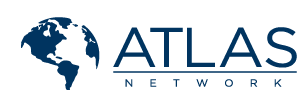 12–13 November 2013, Professor Hannes H. Gissurarson, as the RNH representative, will attend a Platform of European Memory and Conscience conference in the Hague. Immediately afterwards, 14–15 November 2013, Professor Gissurarson will attend a conference in Budapest on the “Financial Crisis: Causes, Consequences, Cures”, and give a paper on Iceland. Thursday 14 November 2013, RNH representatives will attend the annual Freedom Dinner at the Intercontinental Times Square in New York, organised by the Atlas Network with which RNH cooperates; some of the Icelandic attendees will participate in the Liberty Forum taking place in the two days prior to the gala dinner.
12–13 November 2013, Professor Hannes H. Gissurarson, as the RNH representative, will attend a Platform of European Memory and Conscience conference in the Hague. Immediately afterwards, 14–15 November 2013, Professor Gissurarson will attend a conference in Budapest on the “Financial Crisis: Causes, Consequences, Cures”, and give a paper on Iceland. Thursday 14 November 2013, RNH representatives will attend the annual Freedom Dinner at the Intercontinental Times Square in New York, organised by the Atlas Network with which RNH cooperates; some of the Icelandic attendees will participate in the Liberty Forum taking place in the two days prior to the gala dinner.
RNH will also support various initiatives on the Internet and in publishing, in cooperation with Almenna bokafelagid and others, trying to make the research undertaken at the Institute available and accessible, not only to scholars, but also to the general public, through multi-media and by other means. (Some dates here are subject to change.
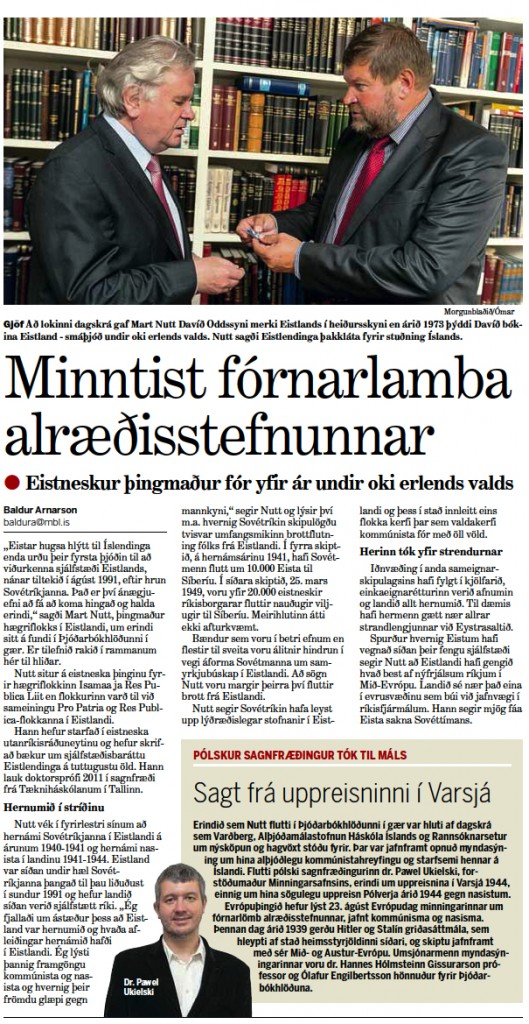 In an interview with the Icelandic government television channel, broadcast in the evening of 23 August, Nutt recalled that he had participated in the “Baltic Way” on 23 August 1989, when more than two million people had held hands and formed a living chain, from Tallinn to Vilnius, to demonstrate their will to see the Baltic states independent and free. In an interview with Morgunbladid 24 August, Nutt said that the Estonians were grateful for the sympathy and support that the Icelanders had shown the Baltic nations. After the event, Nutt met with former Prime Minister David Oddsson and gave him a miniature Estonian flag to commemorate that exactly forty years have passed since Oddsson, then a young law student, translated a book by Swedish-Estonian author Anders Küng, Estonia. A Small Nation under Foreign Yoke into Icelandic. Oddsson was Prime Minister in the summer of 1991 when Iceland became the first state to re-recognise the independence of the Baltic states.
In an interview with the Icelandic government television channel, broadcast in the evening of 23 August, Nutt recalled that he had participated in the “Baltic Way” on 23 August 1989, when more than two million people had held hands and formed a living chain, from Tallinn to Vilnius, to demonstrate their will to see the Baltic states independent and free. In an interview with Morgunbladid 24 August, Nutt said that the Estonians were grateful for the sympathy and support that the Icelanders had shown the Baltic nations. After the event, Nutt met with former Prime Minister David Oddsson and gave him a miniature Estonian flag to commemorate that exactly forty years have passed since Oddsson, then a young law student, translated a book by Swedish-Estonian author Anders Küng, Estonia. A Small Nation under Foreign Yoke into Icelandic. Oddsson was Prime Minister in the summer of 1991 when Iceland became the first state to re-recognise the independence of the Baltic states.

